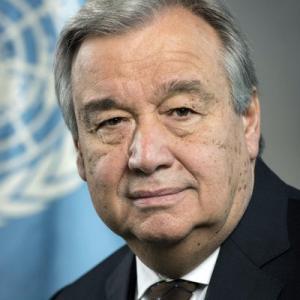People are looking to their leaders for solutions to the climate crisis gripping countries, communities and economies worldwide.
Global emissions are at record highs.
Global temperatures are at record highs.
Heatwaves, storms, floods, droughts and other climate-related disasters are growing in intensity.
Meanwhile, fossil fuel companies are raking in record profits, while people and planet pay the price.
But most importantly, this Summit is a reminder of what the world must do to make the COP28 a true turning point in our fight against climate change.
The science shows the way.
The 1.5-degree temperature limit is the only way forward.
This Global Stocktake must put us on the path to get there and provide a surge in climate action.
We need to leave Dubai with a clear commitment to triple renewables capacity, double energy efficiency and deliver clean power to all people by 2030.
And we need a strong commitment to phase-out fossil fuels on a clear time frame that aligns with the 1.5 degree limit.
No more delays. No more foot-dragging. No more greenwashing.
Renewables create jobs, generate economic growth, and bring affordable energy to people around the world — all while driving down emissions and ensuring a just and equitable transition.
We need the Global Stocktake to set a clear expectation that the next climate action plans, or NDCs, will be more ambitious and high-quality.
Countries need to heed the call of my Acceleration Agenda to speed up net-zero deadlines so that developed countries get there by 2040, and emerging economies by 2050 or as close as possible to those two dates.
And we need a surge in climate justice.
Developing countries are double victims.
First, of climate-fueled disasters they did little to cause.
And second, of extortionate borrowing costs that block climate action on mitigation and adaptation.
The Global Stocktake must show how countries will close the gaps on finance and adaptation.
Developed countries must show how they will double adaptation finance and clarify the delivery of the long-promised $100 billion per year.
This COP outcome must clearly support reform of the multilateral development banks to increase developing countries’ access to private finance at reasonable costs.
And we need to see a boost of the Loss and Damage Fund.
Across all these areas, you are here to discuss solutions.
The diversity of people in attendance reminds us that we are all having a role to play.
Governments need to set their sights high and commit to climate ambition on a massive scale, supporting developing countries every step of the way.
Governments must also provide the private sector with policy and regulatory certainty and predictability, including placing a price on carbon.
Businesses, investors, cities and regions need to help lead the shift away from fossil fuels to renewables.
I call on them to present net-zero commitments and accompanying transition plans fully aligned with the recommendations of my High-Level Expert Group on Net Zero that was created one year ago.
This includes genuine decarbonization with detailed targets for 2025, 2030 and 2035.
And avoiding dubious offsets or carbon credits, in any scope of emissions.
We need scientists and innovators to keep researching and developing solutions to address climate change and drive renewables forward.
My Scientific Advisory Board will help bring together expert advice on major global issues like climate change and translate breakthroughs into practical solutions.
Finally, we need civil society, indigenous groups and young people to keep up the pressure to hold leaders to account, and help develop the concrete solutions we need to safeguard people and planet alike.
Let’s pledge to act with ambition equal to the scale of the crisis.
Let’s deliver the renewable, sustainable and equitable future people and planet deserve.
And I thank you.




